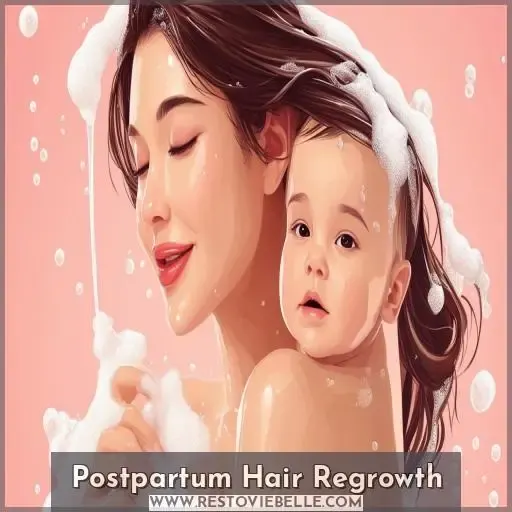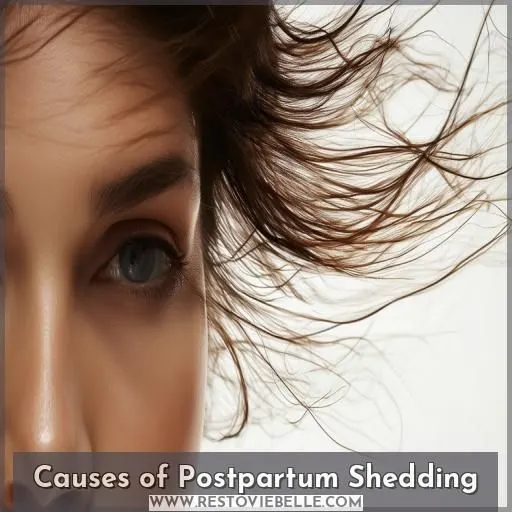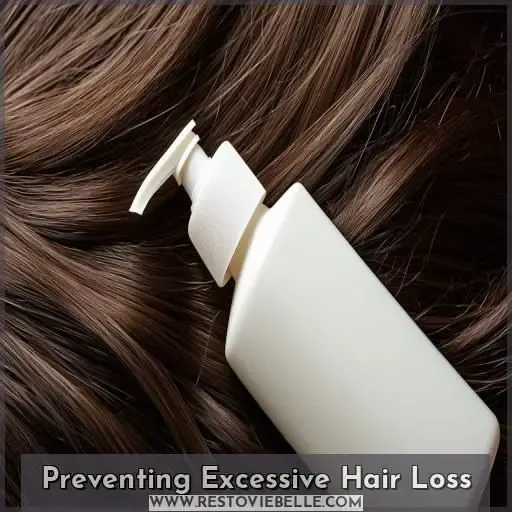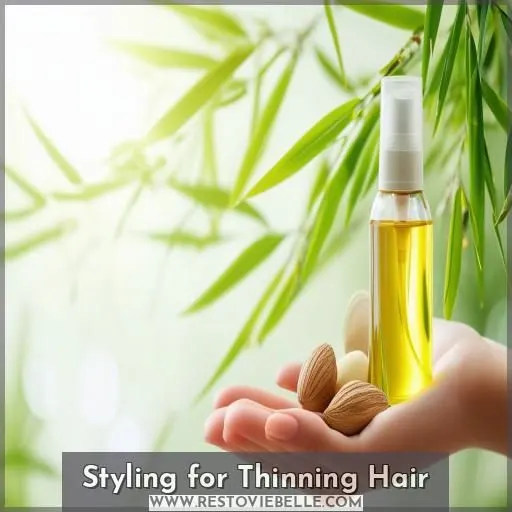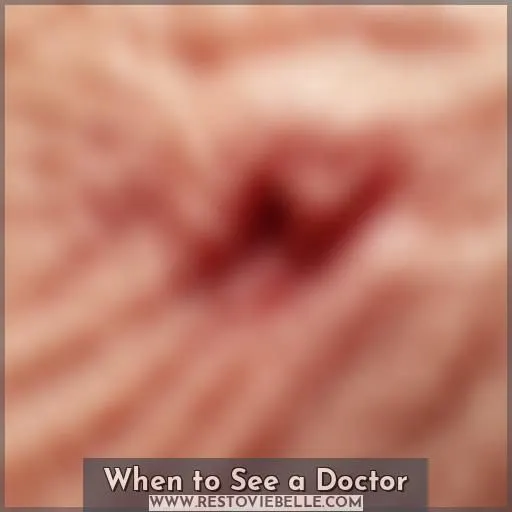This site is supported by our readers. We may earn a commission, at no cost to you, if you purchase through links.
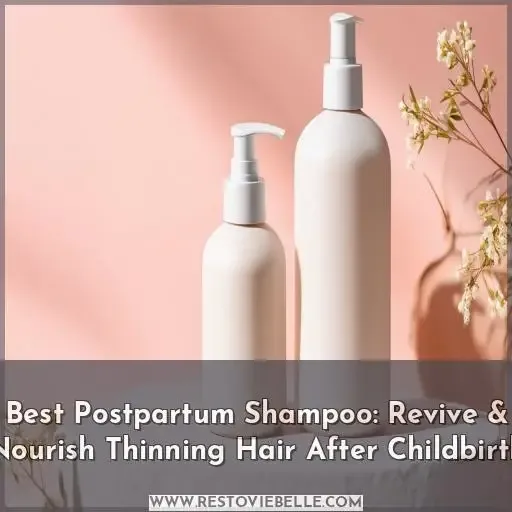 For the best postpartum shampoo, you’ll want something that promotes hair regrowth and prevents further shedding. Look for gentle formulas with ingredients like biotin, keratin, or collagen to nourish strands.
For the best postpartum shampoo, you’ll want something that promotes hair regrowth and prevents further shedding. Look for gentle formulas with ingredients like biotin, keratin, or collagen to nourish strands.
Top picks include Maria Nila Head & Hair Heal, FEKKAI Super Strength, and Philip Kingsley Density Thickening shampoos. Pair your shampoo with supplements like Viviscal for an extra boost.
However, hair loss can signal nutritional deficiencies too, so talk to your doctor if excessive shedding persists.
For now, give your locks some love – you’ll gain tips to style and care for postpartum tresses if you keep reading.
Table Of Contents
- Key Takeaways
- Postpartum Hair Regrowth
- Causes of Postpartum Shedding
- Preventing Excessive Hair Loss
- Styling for Thinning Hair
- When to See a Doctor
- Frequently Asked Questions (FAQs)
- What is the best shampoo after pregnancy?
- How often should you wash your hair during postpartum hair loss?
- How long does postpartum hair shedding last?
- How do I take care of my hair after pregnancy?
- Does breastfeeding cause additional hair loss?
- Is postpartum hair loss different for each pregnancy?
- How long does postpartum hair loss last?
- Can hair extensions help with postpartum shedding?
- When should I consider medical treatment options?
- Conclusion
Key Takeaways
- Investing in a gentle, nourishing shampoo like Maria Nila, FEKKAI, or Philip Kingsley’s thickening formulas can be a real hair-saver during the postpartum shed-fest. Think of them as reinforcements for your strands!
- Don’t just stop at shampoo – supplements like Viviscal are like secret weapons in the battle against excessive hair loss. They sneak in all those growth-boosting nutrients your locks are craving.
- While postpartum shedding is totally normal and expected, if your hair starts disappearing in alarming clumps or bald patches, it’s time to call in the big guns (your doctor). Sometimes there’s an underlying issue that needs addressing.
- Patience is key, mama! As frustrating as it can be watching your once-luscious mane thin out, this too shall pass. With some TLC and the right hair-care routine, your gorgeous locks will make a comeback before you know it. Just think of it as your hair’s version of maternity leave!
Postpartum Hair Regrowth
To support your postpartum hair regrowth, opt for products like Maria Nila Head & Hair Heal Shampoo and FEKKAI Super Strength Shampoo, which nourish and strengthen your hair. Using supplements like Viviscal can also help improve hair health from within.
1. Maria Nila Head & Hair Heal Shampoo
Maria Nila Head & Hair Heal Shampoo is excellent for postpartum hair regrowth.
It soothes and strengthens your hair and scalp using ingredients like Piroctone Olamine and natural aloe vera extract.
This moisturizing formula, with a delightful floral scent of white jasmine, galbanum, and linden blossom, is gentle on sensitive skin and free from allergens.
It also features a Colour Guard Complex, protecting your hair from UV radiation and free radicals, promoting healthier, stronger hair postpartum .
Best For: Women experiencing postpartum hair regrowth
- Soothes and strengthens hair and scalp
- Contains Piroctone Olamine and natural aloe vera extract
- Allergen-free perfume with a refreshing floral scent
- Prime shipping delays reported on Amazon
- Only available in liquid form
- Not suitable for all hair types
2. FEKKAI Super Strength Shampoo
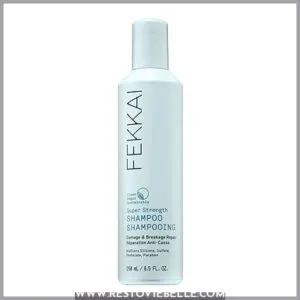
FEKKAI Super Strength Shampoo is an excellent option for postpartum hair regrowth. This potent shampoo offers multiple benefits:
- It treats damaged hair, making it softer and healthier.
- It combats hair breakage, which is ideal for postpartum mothers dealing with hair loss.
- Its eco-friendly formula is free from gluten and parabens, ensuring gentle care for both your hair and the environment.
- Additionally, it detangles and moisturizes dry, brittle hair, enhancing natural shine.
Best For: Postpartum mothers experiencing hair regrowth and breakage.
- Treats damaged hair, making it softer and healthier.
- Combats hair breakage, ideal for postpartum mothers dealing with hair loss.
- Eco-friendly formula free from gluten and parabens.
- Scent may be overpowering for some.
- May cause dryness and flakiness in some cases.
- Bottle may not be properly sealed upon delivery.
3. Philip Kingsley Density Thickening Shampoo
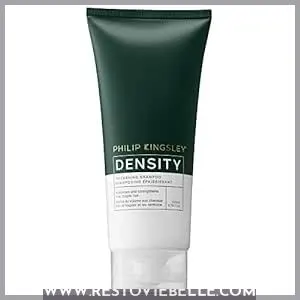
Using Philip Kingsley Density Thickening Shampoo can be a game-changer for postpartum hair regrowth.
This unscented, gel-based shampoo is designed specifically for fragile, thinning hair, making it perfect during the shedding phase after childbirth. It contains polymers, peptides, and salicylic acid, which help improve hair health, add volume, and strengthen hair from within the cortex (Source).
The shampoo also gently exfoliates and stimulates the scalp, creating a healthier environment for new hair growth.
Best For: Postpartum hair regrowth and fragile, thinning hair
- Improves hair health, condition, and quality
- Adds volume to hair
- Strengthens hair from deep within the cortex
- Price is outrageous for the effects
- Doesn’t seem to work
- Left hair lifeless and scalp itchy
4. Head and Shoulders Classic Clean Shampoo
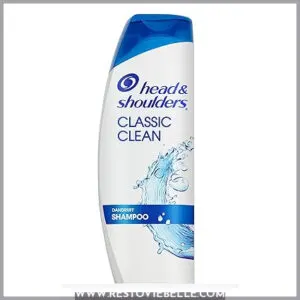
The Head & Shoulders Classic Clean Shampoo is excellent for postpartum hair regrowth, offering 72-hour dandruff protection to maintain a healthy scalp.
Its HydraZinc formula tackles flakes, itch, and dryness, ensuring your scalp stays nourished.
Suitable for all hair types, it delivers strong, great-looking hair while being easy to use daily.
The shampoo’s pleasant, light scent adds a touch of freshness, making it a reliable choice for new mothers dealing with postpartum hair issues.
Best For: Postpartum hair regrowth and maintaining a healthy scalp.
- 72-hour dandruff protection
- HydraZinc formula tackles flakes, itch, and dryness
- Light, classic scent
- May be pricey for some
- Size may be too small for some
- May not be suitable for all hair types
5. John Frieda Volume Lift Conditioner
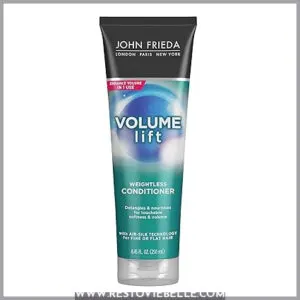
Considering the postpartum period, John Frieda Volume Lift Conditioner is a game-changer for regrowth.
It’s designed for fine, flat hair, enhancing its volume and fullness.
Being safe for color-treated hair, it tackles hair fall issues by softening and providing bounce.
Caffeine acts as a stimulant, promoting hair health right from the roots.
Ideal when used with a matching shampoo, it will help you manage post-pregnancy hair concerns effectively.
Volume and movement will be your hair’s new normal .
Best For: Postpartum hair concerns, especially for those with fine or flat hair.
- Enhances fullness and volume
- Safe for color-treated hair
- Softens hair and provides movement
- Not specified
6. Viviscal Hair Growth Supplements
View On Amazon
Viviscal Hair Growth Supplements are scientifically formulated to nourish thinning hair and promote regrowth, especially beneficial postpartum. Backed by 25 years of research, these supplements feature the proprietary AminoMar Collagen Complex alongside Biotin, Zinc, Vitamin C, Iron, and Niacin, all essential for hair health.
Results are typically noticeable within three months, making Viviscal an effective option for postpartum hair regrowth. Remember, it’s important to use the supplements consistently and consult your healthcare provider, especially if you have underlying health conditions .
Best For: Postpartum hair regrowth
- Scientifically proven to promote hair growth and reduce hair loss
- Backed by 25 years of research and development
- Results visible within 3 months
- May not be effective for everyone
- Not suitable for those with an allergy to seafood (fish and shellfish)
- It is important to follow the recommended dosage and duration of use
Causes of Postpartum Shedding
Postpartum shedding is commonly triggered by hormonal changes, particularly the drop in estrogen levels after giving birth (Source). Additional factors such as stress, fatigue, and nutritional deficiencies can further contribute to hair loss during this period (Source).
Hormonal Changes
After giving birth, your hormone levels, particularly estrogen and progesterone, drop drastically, leading to Postpartum hair loss. This sudden change in hormones puts your hair into a shedding phase. Here are the main hormonal changes causing postpartum shedding:
- Estrogen drop
- Progesterone decline
- Thyroid issues
Understanding these changes is essential for effective postpartum hair loss treatments.
Stress and Fatigue
Postpartum stress and fatigue can be major culprits for excessive hair shedding. You’ve just been through an incredibly demanding experience – your body needs time to recover and rebalance. Postpartum depression, estrogen decline, sleep deprivation, and thyroid issues can all contribute to thinning locks. Prioritize self-care with relaxation techniques and haircare that nourishes your scalp.
Nutritional Deficiencies
You might also be shedding more hair than usual due to nutritional deficiencies. The demands of pregnancy and breastfeeding can deplete your body’s stores of key nutrients like iron, zinc, vitamin D, and protein – all essential for healthy hair growth. Dietary changes and targeted supplements can assist in replenishing these nutrients and support postpartum hair regrowth.
Preventing Excessive Hair Loss
You can help prevent excessive postpartum hair loss by taking Prenatal vitamins before and after giving birth to guarantee you’re getting the necessary nutrients for healthy hair growth. Additionally, maintaining a balanced diet rich in protein, iron, and vitamins like biotin can support the regrowth of strong, thick hair.
Prenatal Vitamins
You can help prevent excessive postpartum hair loss by continuing your prenatal vitamins after giving birth. These supplements provide:
- Folic acid for healthy cell growth
- Vitamin B12 for hair follicle support
- Iron to prevent deficiency-related shedding
- Essential nutrients for overall hair health
Stay consistent with your prenatal vitamin regimen to nourish your body and promote strong, healthy locks.
Balanced Diet
You’ll also want to make certain you’re eating a balanced diet rich in essential nutrients for hair growth, like protein, iron, zinc, and vitamins C and B. Nutrient deficiencies can exacerbate postpartum shedding, so nourish your body with whole foods like eggs, leafy greens, nuts, and lean meats. Stay hydrated too – proper hydration supports overall hair health.
Scalp Massage
Additionally, scalp massage is a simple yet effective way to promote postpartum hair regrowth. Give your scalp some love by:
- Massaging with your fingertips in circular motions
- Using a soft-bristled brush or scalp massager
- Applying a nourishing scalp serum or oil
- Exfoliating gently once a week
This stimulates blood flow and hair follicles while removing buildup, creating a conducive environment for new growth.
Styling for Thinning Hair
To style thinning postpartum hair, be gentle when brushing to avoid unnecessary breakage. Opt for loose, low-maintenance hairstyles that don’t pull or stress the hair strands, such as a loose bun or braid.
Gentle Brushing
When brushing postpartum thinning hair, be gentle. Use a soft, wide-tooth comb or brush designed for wet hair. Avoid excessive brushing, which can cause breakage. While washing, gently massage the scalp with your fingertips to remove buildup without pulling at strands. Leave-in treatments like conditioning masks can help strengthen delicate hair.
Loose Hairstyles
For maximum scalp health and minimum hair breakage, opt for loose hairstyles postpartum. Here are some options:
- Loose buns or ponytails
- Braids that don’t pull tightly
- Headbands or clips to keep hair off your face
Avoid anything that tugs or cinches your strands. Volumizing products can also help boost your hair’s appearance during this time.
When to See a Doctor
While postpartum hair loss is normal and temporary for most women, you should see a doctor if you experience severe shedding, patchy hair loss, or persistent thinning beyond the typical 6-12 month period. These could indicate an underlying medical condition or nutrient deficiency that requires evaluation and treatment.
Severe Shedding
You’ll know it’s time to consult a professional if you’re experiencing severe shedding that doesn’t seem to improve. Here’s when it might be worth seeing a doctor:
| Symptom | Description |
|---|---|
| Excessive Clumps | Losing large amounts of hair daily |
| Bald Patches | Noticeable thin or bare spots forming |
| Persistent Thinning | Hair loss continues for over a year |
| Scalp Issues | Itching, redness, or other irritation |
| No Regrowth | Complete lack of new hair growth |
Trust your instincts—severe or prolonged postpartum hair loss may require medical intervention.
Patchy Hair Loss
You should see a doctor if you notice patchy hair loss, as it could indicate an underlying condition like:
- Scalp inflammation or infection
- Hormonal imbalance
- Autoimmune disorder
Get prompt evaluation, as certain ingredients in hair products may aggravate the issue. Discuss topical treatments to promote regrowth in affected areas.
Persistent Thinning
If shedding persists beyond a year, it’s time to consult a doctor. Chronic thinning can signal an underlying condition like iron deficiency or thyroid issues. Monitor for signs like patchy loss, scalp irritation, or excessive shedding. Proper nutrition, stress management, and topical treatments can promote regrowth:
| Product | Use |
|---|---|
| Minoxidil | Topical treatment |
| Nutrafol | Supplement |
| Olaplex | Strengthening |
| Rogaine | Regrowth serum |
| Viviscal | Multivitamin |
Frequently Asked Questions (FAQs)
What is the best shampoo after pregnancy?
Ha! Expecting a miracle shampoo after the postpartum hair-pocalypse? Try the Nécessaire Rosemary Shampoo – it’s a volume-boosting, follicle-stimulating powerhouse that’ll revive your tired tresses.
How often should you wash your hair during postpartum hair loss?
During postpartum hair loss, you’ll want to wash your hair every 2-3 days. Too much washing can strip your hair of its natural oils and lead to more breakage. Be gentle when shampooing and use a sulfate-free formula.
How long does postpartum hair shedding last?
Typically, your postpartum shedding peaks around 3-4 months after delivery but can last up to a year, with some experts suggesting it’s over when your baby’s 1st birthday rolls around.
How do I take care of my hair after pregnancy?
To care for postpartum hair, use gentle, sulfate-free products, avoid heat styling, and get regular trims. Massage your scalp, eat a balanced diet, and consider supplements like biotin or collagen. Be patient – regrowth takes time but consistency pays off.
Does breastfeeding cause additional hair loss?
No, breastfeeding itself doesn’t directly cause additional hair loss postpartum. The hormonal shifts and physical stress after childbirth are the primary culprits behind postpartum shedding.
Is postpartum hair loss different for each pregnancy?
Yes, postpartum hair loss can be a different ball game with each pregnancy. While the pattern is often similar, factors like stress levels, hormones, and overall health can swing the shedding severity.
How long does postpartum hair loss last?
Postpartum hair loss typically lasts 3-6 months, peaking around 4 months after giving birth. But don’t worry—your gorgeous locks will bounce back within a year as those hormones level out.
Can hair extensions help with postpartum shedding?
Yes, extensions can disguise thinning areas and give the illusion of fuller hair during postpartum shedding. Just be gentle when installing and removing them to avoid additional hair loss.
When should I consider medical treatment options?
As the old adage goes, "Patience is key." Consider medical treatment if excessive shedding persists for over a year despite lifestyle changes and hair-care products. Your doctor can evaluate the root cause and recommend appropriate solutions.
Conclusion
While hair shedding can feel disheartening, selecting the best postpartum shampoo designed to meet your needs, coupled with a balanced diet and self-care routine, can help restore your mane’s glory. Remember, excessive or persistent shedding warrants a consultation with your healthcare provider. With patience and the right approach, you’ll soon be embracing your luscious locks once again.

